Table of Contents
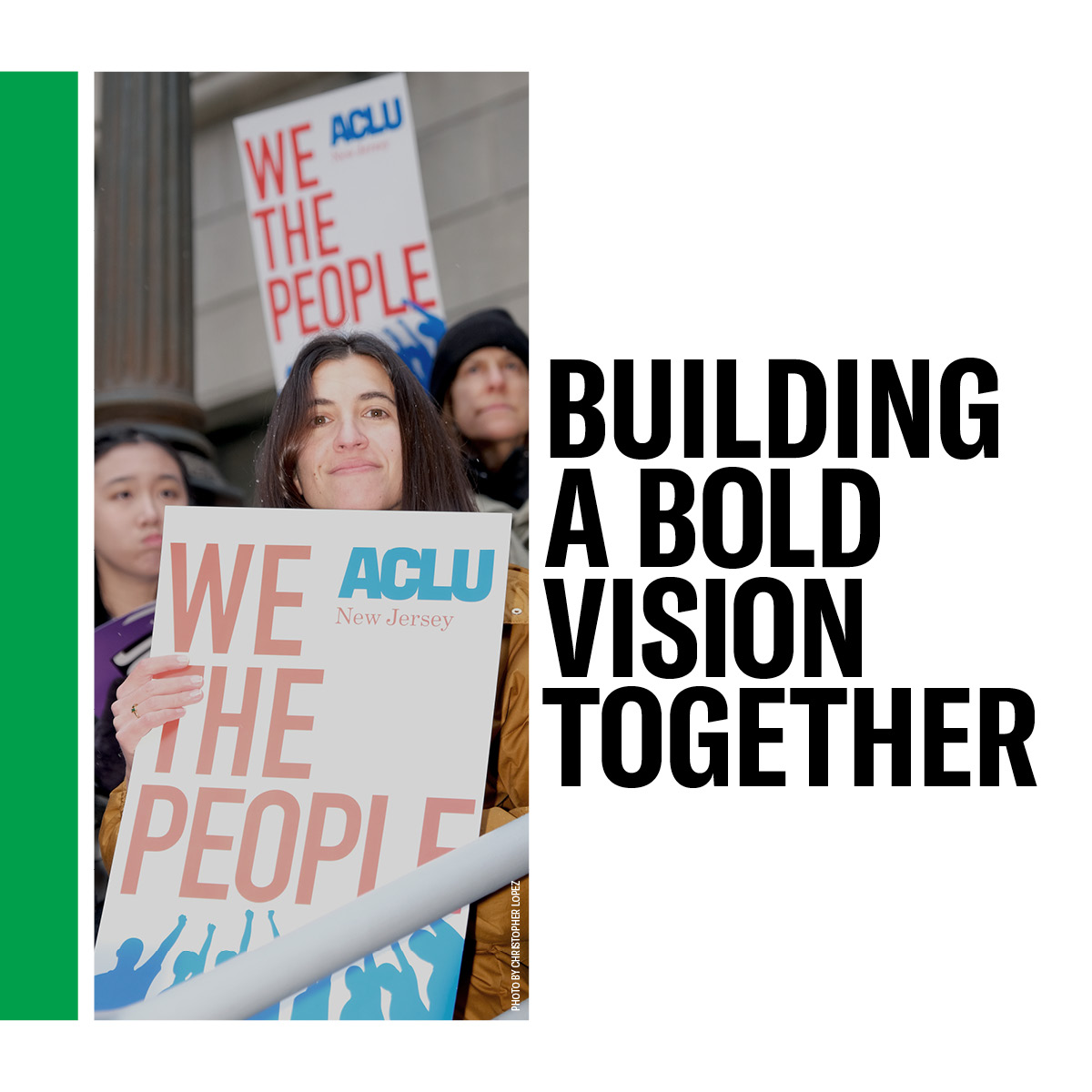
Building A Bold Vision Together
A Letter from Our Executive Director and President
In the past year, with your support, advocacy by the ACLU of New Jersey secured new protections for our most fundamental freedoms.
We pushed for the passage of legislation that will ensure crisis response teams – not police officers – are the first on scene when New Jerseyans call for help during a mental health emergency. We partnered with community organizations to pass bills that strengthened immigrants’ rights and made New Jersey fairer and more welcoming. We defended the rights of new mothers who were drug tested without consent. We defeated censorship attempts that have no place in a healthy democracy.
These victories cement New Jersey’s position as a national leader on racial and social justice. But as we achieved these milestones together, we also faced renewed – though all too familiar – threats to civil rights and civil liberties.
Some attempted to restrict reproductive health care. Others tried to further shield police officers from accountability. Even more fought to ban books and conceal public records.
The ACLU-NJ has been at the vanguard of inclusive progress for more than 60 years – so we’ve seen this before.
And on every occasion where those in power want to attack our rights, we remain steadfast in our mission to defend liberty and justice for all. In these moments, especially, it’s our responsibility to lead our state toward our vision of a more equitable New Jersey.
That means deploying our expertise in the courts, in the legislature, and in our communities. That means holding leaders accountable, correcting the record, and providing innovative and data-driven solutions for the most pressing challenges of our time.
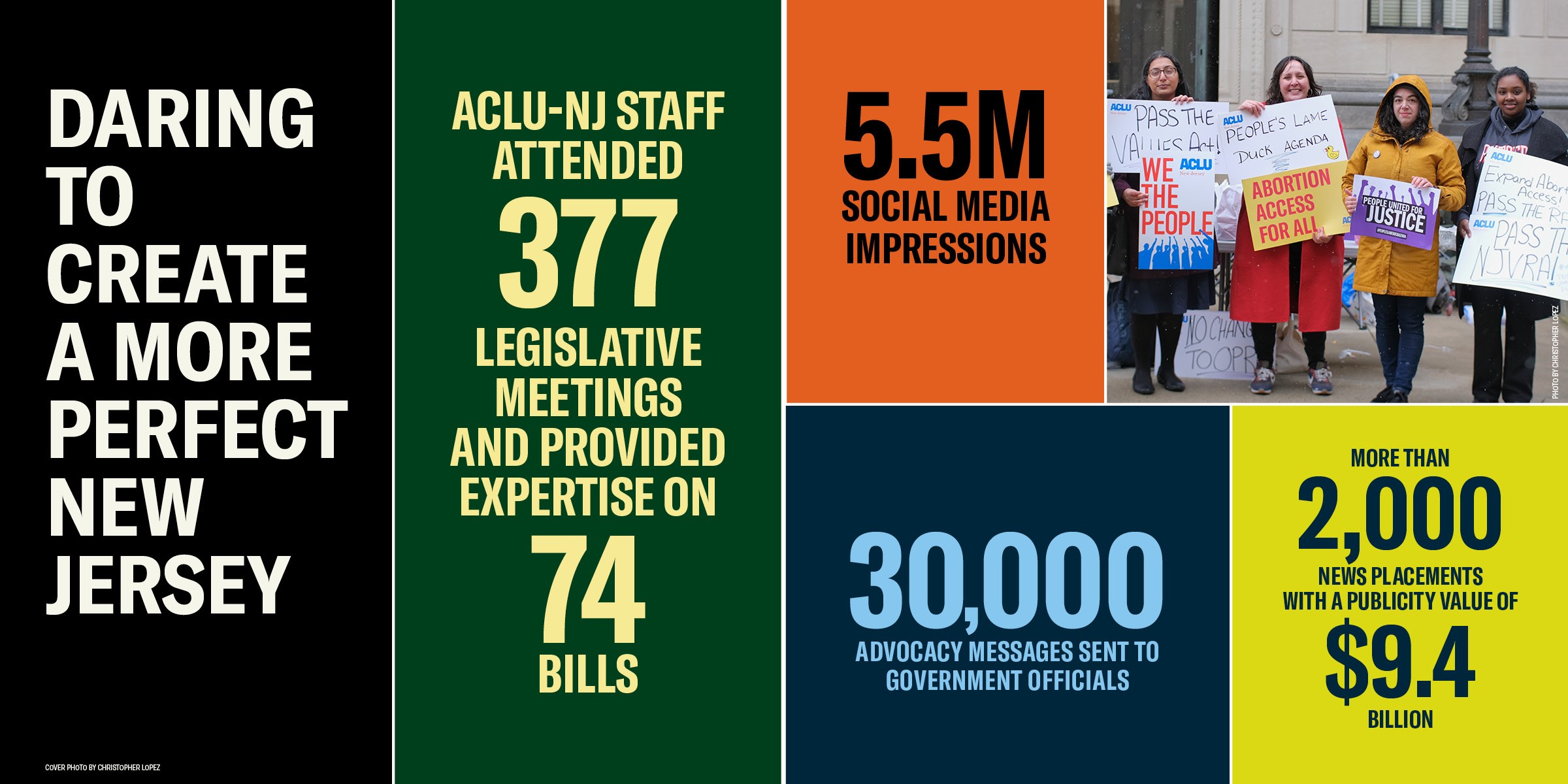
We have bold goals for 2024 – a crucial election year. From ensuring reproductive freedom is accessible for all and expanding the right to vote, to reimagining our criminal legal system and expanding immigrants’ rights, our values and our democracy are on the line. We know New Jersey can, and must, move our country forward.
We’re ready for this moment, and we sincerely hope you’ll join us.
Onward,

Amol Sinha
Executive Director

Marc Beebe
President of the Board of Trustees
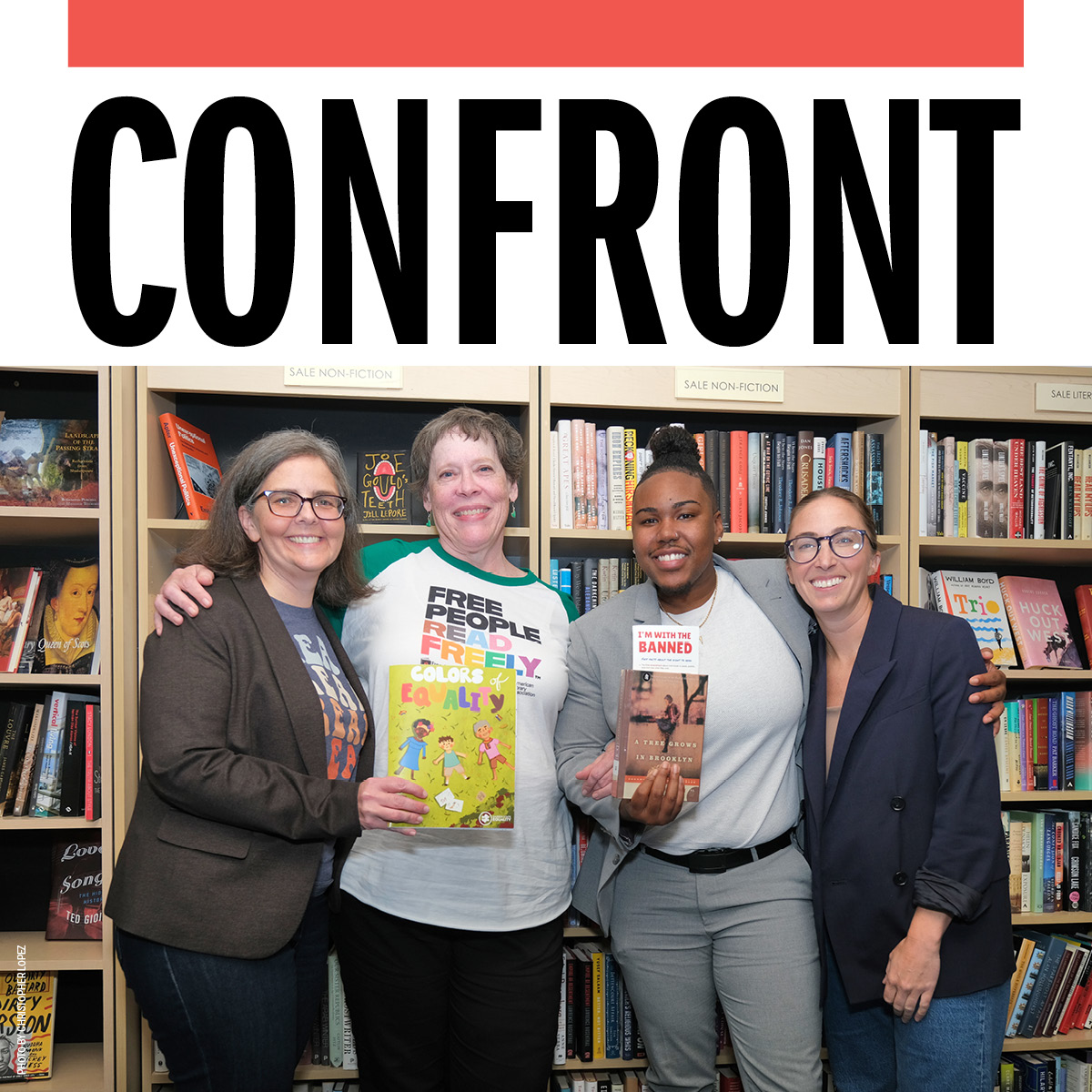
In October, the ACLU-NJ hosted a panel discussion, More than Empty Shelves: How Book Bans Undermine Identities and Restrict Information, with ACLU-NJ Legal Director Jeanne LoCicero (left), New Jersey Library Association 2023 Librarian of the Year Martha Hickson, Deputy Director of Garden State Equality Brielle Winslow-Majette, and Pen America Freedom to Read Program Director Kasey Meehan (right).
Confronting Book Bans
The ACLU has defeated censorship attempts throughout the nation for over 100 years.
In recent years across the nation, we’ve seen a resurgence of systematic attempts to ban books from libraries, classrooms, and curriculums with the aim to undermine experiences across all races, genders, and sexualities. Even though New Jersey has been a national leader in protecting and expanding civil rights and liberties, there have been censorship attempts across the state
in the past year
Censorship is the suppression of content or ideas – and it happens when one group imposes their beliefs on another. Banning books is a type of censorship, but the act can take many forms, like removing a book from the shelf, requiring parental permission to read it, or moving it to a less accessible section.
The ACLU has defeated censorship attempts throughout the nation for over 100 years. Take us at our word: the first step to dismantling any effort to limit access to books – and protecting the themes and experiences they feature – is being able to identify it.
That’s why we’re partnering with community leaders to empower all New Jerseyans with the knowledge they need to push back against any attempts to ban books in their towns.
In May, we joined leading authors, librarians, and academics at the Montclair Literary Festival where we discussed recent and growing attacks on the freedom to read, the dangers it signals, and how to act. In October, we hosted a panel discussion where experts explained the responsibility we all have to protect the right to freely speak, think, read, and write.
Banning books means more than taking them off the shelf: it threatens the very foundation of our democracy. We must learn from our nation’s history, reject discriminatory attacks by prioritizing inclusive policy change, and protect New Jerseyans’ fundamental rights – especially for those who are most vulnerable.
As the right to access information is under attack, New Jersey has an obligation to lead by example in defending it.
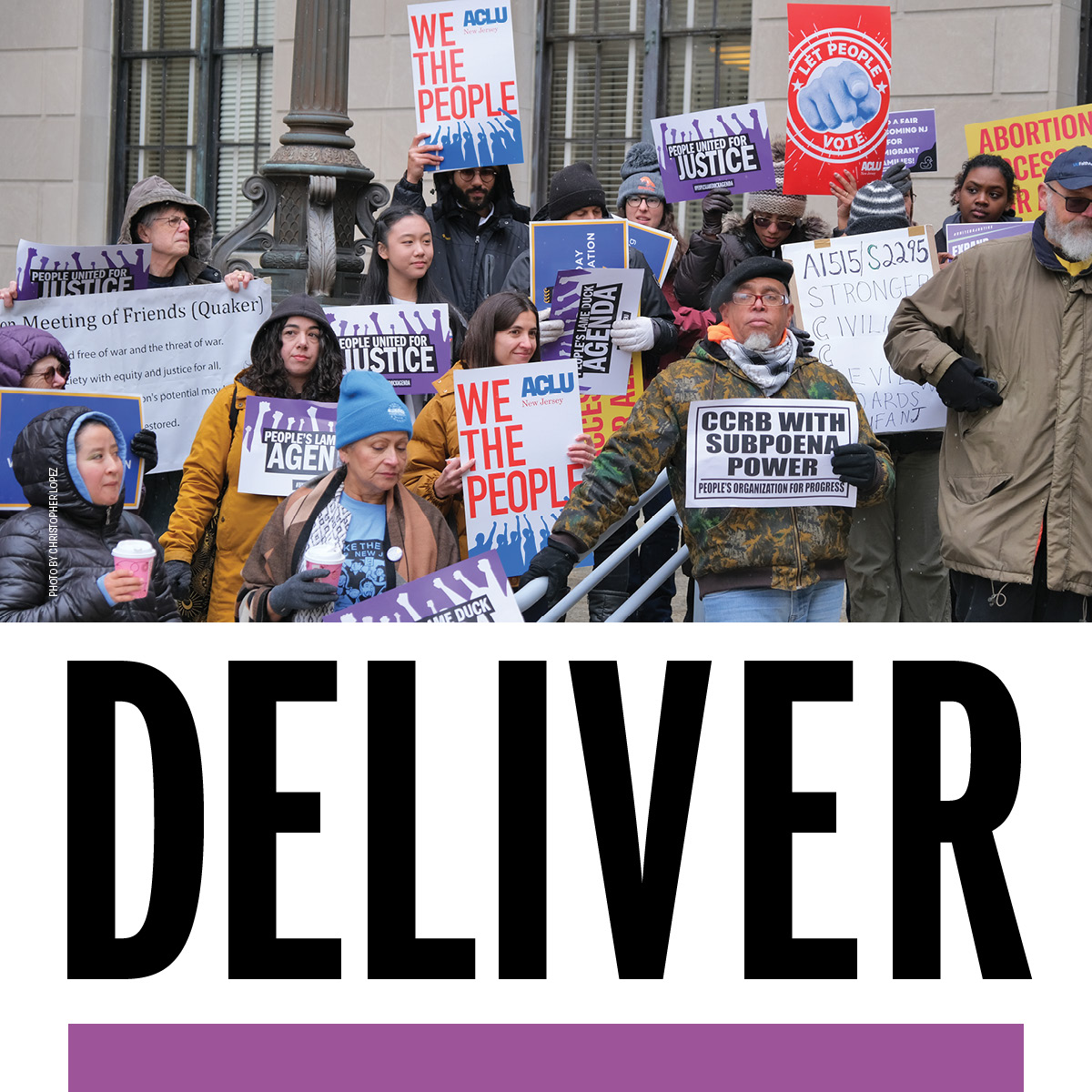
Delivering the People's Agenda
Calling for protections and expansions of fundamental rights that are essential to building a fair and welcoming future.
The end of 2023 brought a Lame Duck session to the Legislature – and with it an opportunity for New Jersey to pass legislation that advanced racial and social justice.
To ensure New Jerseyans’ voices were heard, we joined community partners in November to deliver the People’s Agenda to every legislative office across the state – all in all, 28 advocacy organizations appeared at more than 100 suites urging lawmakers to pass nearly 20 bills expanding fundamental rights.
Weeks later, Gov. Murphy signed many of those landmark pieces of legislation into law.
To strengthen immigrants’ rights, lawmakers passed bills to increase language access, disaggregate demographic data, and extend new protections to domestic workers. These changes are essential to building a fair and welcoming future where all New Jerseyans can support their families and fully participate in their communities without fear.
To begin addressing overpolicing, especially in communities of color, lawmakers passed the Seabrooks-Washington Community-Led Crisis Response Act that creates a pilot program for Community Led First Response Teams in several New Jersey counties. These teams will serve as an alternative to law enforcement response to mental health, substance use, and other nonviolent incidents.
Seeing these important bills signed into law further cemented New Jersey’s position as a national leader on civil rights and liberties. It also made one fact perfectly clear: when we fight, we win.
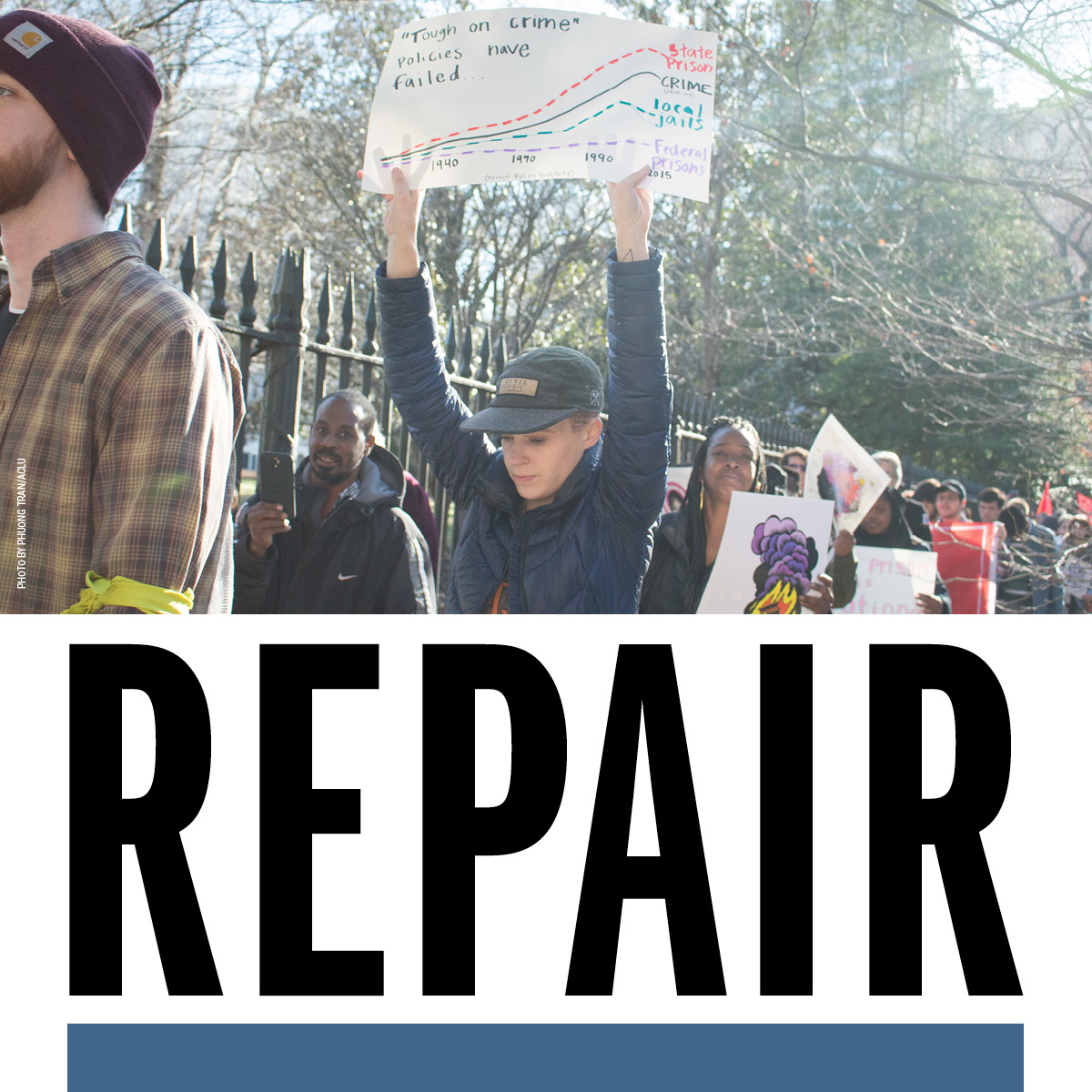
Repairing an Unjust Criminal Legal System
New Jersey prisons continue to have the highest rate of racial disparity in the nation, making decarceration fundamental to racial justice here, and beyond.
After decades of dedicated advocacy, the ACLU-NJ has helped lay the foundation for reimagining the criminal legal system in New Jersey through policy change that has reduced the state’s prison population by more than 50 percent since 2011. But despite this historic reduction, New Jersey prisons continue to have the highest rate of racial disparity in the nation, making decarceration fundamental to racial justice here, and beyond.
In June, we released a landmark report, Decarcerating New Jersey, which analyzes state incarceration data from 2017-2022, a period when New Jersey led the country in prison reductions. In it, we reject fearmongering and “tough-on-crime” policies that only further drive mass incarceration and division – data shows that violent crime is trending downward in tandem with drastic reductions in the state’s incarcerated population. Instead, we offer a transformative vision of justice.
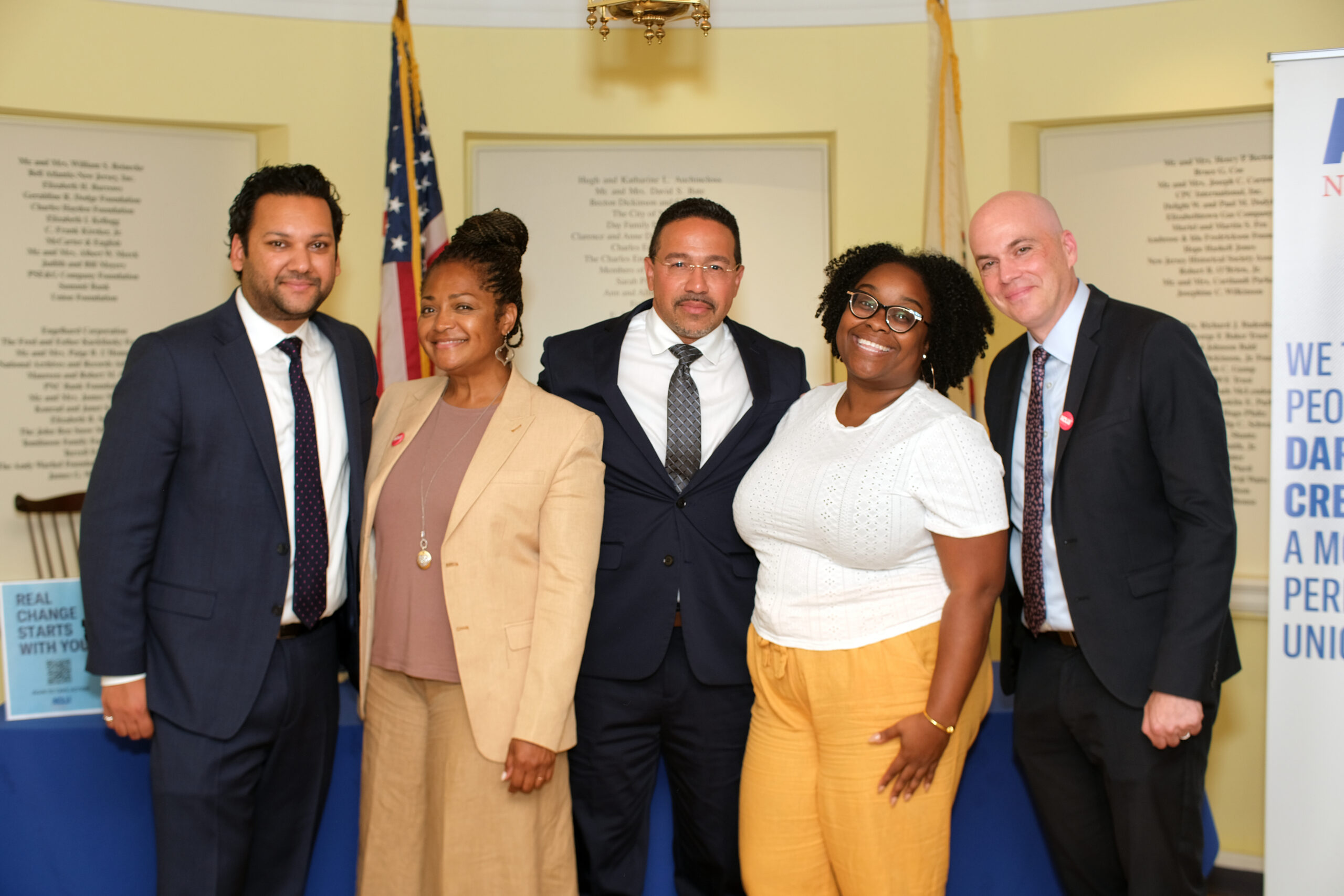
In June, the ACLU-NJ hosted a panel discussion, Expanding Freedom and Centering Humanity, A Vision of Decarceration in New Jersey, with Amol Sinha, Executive Director of the ACLU-NJ (left); Cynthia Roseberry, Acting Director of the ACLU Justice Division; Luis A. Torres, B.S. in Criminal Justice and lived experience in the carceral space; Kassandra Frederique, Executive Director of the Drug Policy Alliance; and Alexander Shalom, Director of Supreme Court Advocacy of the ACLU-NJ. Photo by Christopher Lopez.
Our recommendations include abolishing mandatory minimum sentences, leveraging categorical clemency, expanding opportunities for compassionate release, and eliminating criminal and civil penalties for drug use and possession.
It’s critical to keep building on this momentum to tackle deep racial disparities and reduce New Jersey’s incarcerated population. With wholesale change, we can continue to build stronger communities – and reimagine the criminal legal system as we know it.
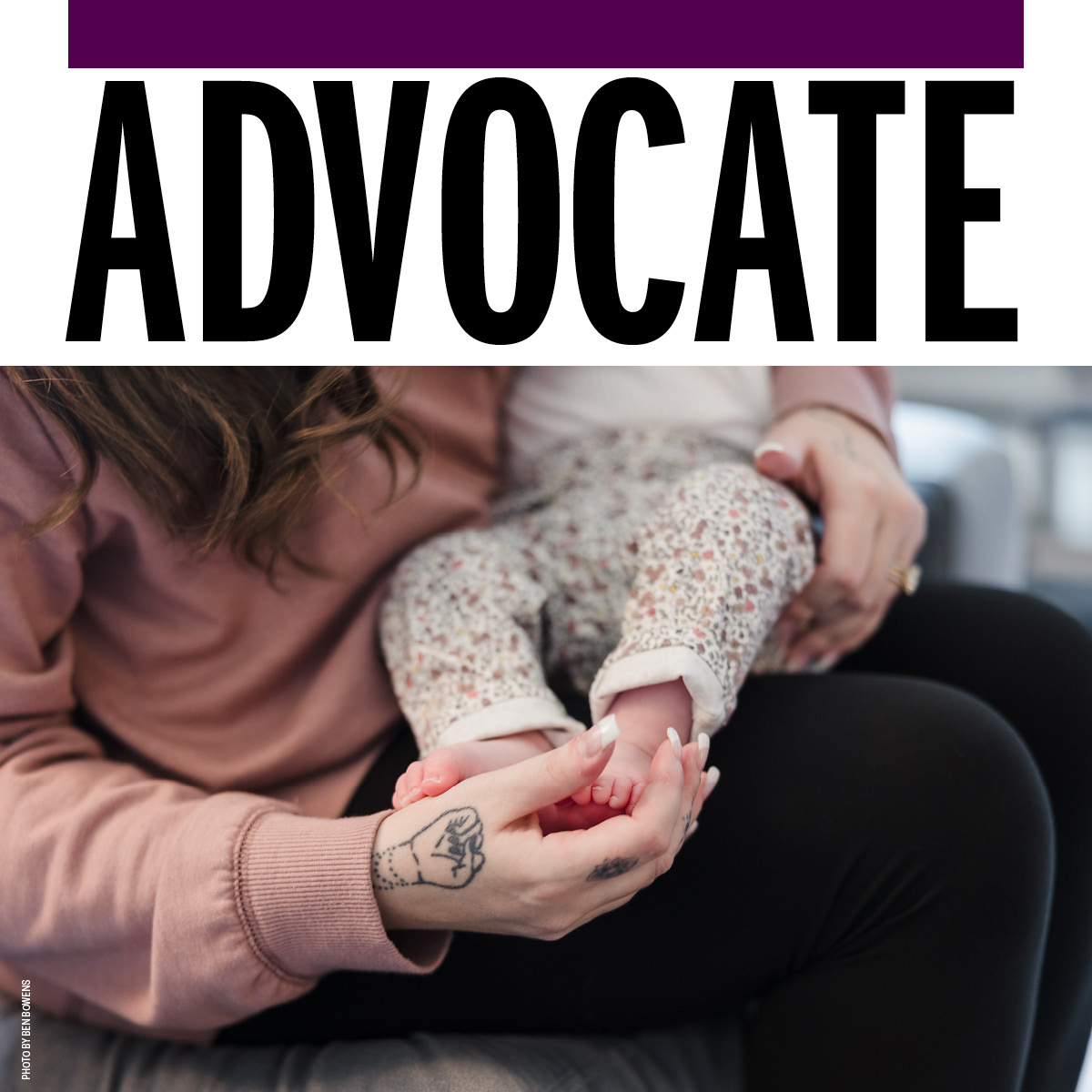
Advocating for Pregnant People
Hospitals' practice of drug testing pregnant patients violates New Jersey's Law Against Discrimination on the basis of sex and pregnancy — it must end.
Imagine if eating your morning bagel led you to test positive for opiates on a drug test.
In March, two women represented by the ACLU-NJ filed complaints with the New Jersey Division on Civil Rights after they were drug tested without their knowledge upon arriving at the hospital to give birth. The filings allege that the hospitals’ practice of drug testing pregnant patients violates New Jersey’s Law Against Discrimination on the basis of sex and pregnancy and seek, among other relief, that both hospitals end this unlawful practice.
Both women’s tests returned positive for opiates after their consumption of an “everything” bagel with poppy seeds that morning. Based on these tests alone, the hospitals then reported both women for possible abuse or neglect before they even had the chance to parent their newborn children. This led to an invasive, traumatic investigation of each woman’s family.
But regardless of what triggers a positive result, patients should never be tested without their consent, and healthcare providers should not automatically report patients to state authorities based on a positive test alone. Test-and-report practices turn once-trusted healthcare providers into arms of the family policing system, discouraging people from seeking necessary care. The stakes are far too high, particularly for Black women in New Jersey, who face unjustified higher levels of suspicion around drug use and experience the second highest Black maternal mortality rates in the
country.
In filing their complaints, both mothers are sending a clear message to hospitals that these testing and reporting policies are unacceptable – and New Jersey must advance and protect reproductive freedom.
Stay Informed
Sign up to be the first to hear about how to take action.
By completing this form, I agree to receive occasional emails per the terms of the ACLU’s privacy statement.
By completing this form, I agree to receive occasional emails per the terms of the ACLU’s privacy statement.
